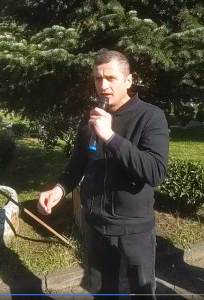Chiatura Georgia: Miners take up the fight
- Details
- Created: Saturday, 09 November 2024 20:51
- Hits: 637

Following the election victory of the reactionary Georgian government at the end of Oktober, the manganese monopoly has locked out 3,000 miners and 2,000 metalworkers in manganese processing. In addition, the workers are to forgo 40% of their wages and benefits. In addition
The miners and metalworkers are not prepared to do this. Our unwavering solidarity belongs to them! We have received the following appeal from your initiative group of Chiatura miners as an open letter:
Appeal of the Chiatura Miners' Initiative Group:
After the protests a year and a half ago (summer 2023), we and our co-workers received a whole list of promises, the resolution of which was supposed to solve the problems accumulated over the years, which worried not only employees, but also the absolute majority of residents of Chiatura and surrounding villages.
As you know, our list of demands was as follows:
1. 40% salary increase with indexation (not applicable to management).
2. Return to pre-Februady 1 work quotas.
3. Freeze bank interest rates and cancel interests what has already been issued.
4. Change the insurance company and improve the conditions.
5. The right to use vacation.
6. Start work immediately.
7. Replace and update mining equipment.
8. Improve and bring in healthier food rations.
9. Give (return) employees the right to use a sanatorium.
10. Pay 100% of wages on the sick leave.
11. Full compensation for the time on protest from June 7.
12. Maintain the highest level of labor safety.
13. Abolish all LLCs and unite them into one organization.
14. When extracting by open-pit mining, permission from residents of local villages or cities should be mandatory, as required by Georgian and international legislation.
15. Strictly monitor the health of water, air, and living conditions, as required by human rights, and after extraction, recultivate the damaged nature or surface in accordance with local eco-culture.
During this action, the health of many of our employees was damaged, both through self-harm as a sign of protest and through hunger strikes.
There were constant threats, blackmail, attempts at division and other attempts at psychological pressure.
Despite all this and the lack of organizational or economic (for families) funds, our struggle yielded results. The result was a promise to give another chance to the management, that all these demands would be considered and more or less satisfied over time.
After a year and a half, immediately after the election cycle ended, we encountered even greater cynicism and ridicule from the company. According to August 2024 data, that is, in 8 months, the company, which produces 400 millions worth of products, declares that it is in crisis and is in financial difficulties.
3400 families of miners in Chiatura and workers in the Zestaponi ironworks were offered only 60% of their salaries for 6 months and the maintenance of their insurance.
They did not even consider the bank obligations that almost 100% of these people have and that they are more likely to suffer from poverty and hunger. They were given the choice of feeding and warming their families in the winter or paying their obligations to the banks.
The initiative group made the only demand that bank obligations be frozen at the current level until the work process is fully restored.
The company responded to this constructive and logical request by conducting weeks of negotiations and finally came to the conclusion that there are better banks in the world with whom it is possible to cooperate, but what is the process, how will it proceed, how long will it take to introduce this "better" bank and what the final conditions will be - this remains a mystery to us.
Given the specifics of the city, the mine's shutdown is the city's shutdown, 40% is lost not only to the worker and his family, but also to the city itself. Its economy and each resident.
Despite the closure of mines and metallurgical enterprises, small cooperatives and small metallurgical plants do not stop mining and processing, which raises doubts in us that the quality and price of manganese are being exploited: mountain (Tunnel) mining costs the company $12 per ton/percent (richness of manganese), while open-pit mining, which destroys nature, living conditions and even had fatal outcomes due to excavated and abandoned quarries, costs only $2 per ton/percent.
Our bitter experience has shown us that no investor cares about the fate of workers and local residents, their living or working environment, ecology, and the future of our land in general.
They only care about making as much profit as possible in as little time as possible. Only this can explain the actions that we constructively followed, and despite numerous concessions and given chances on our part, we still face this result.
Therefore, our constructive, lenient demands have turned into a demand based on experience and logic: complete nationalization of mining, infrastructure, transportation, licensing, processing, research, sales, and all other process organizations or enterprises that have even a small role in the chain from raw material extraction to sales.
We have decided to fight, and our first step will be to completely block the transportation of manganese out of the city.
Not a single gram of our wealth will leave its place of origin until our demands are met.









